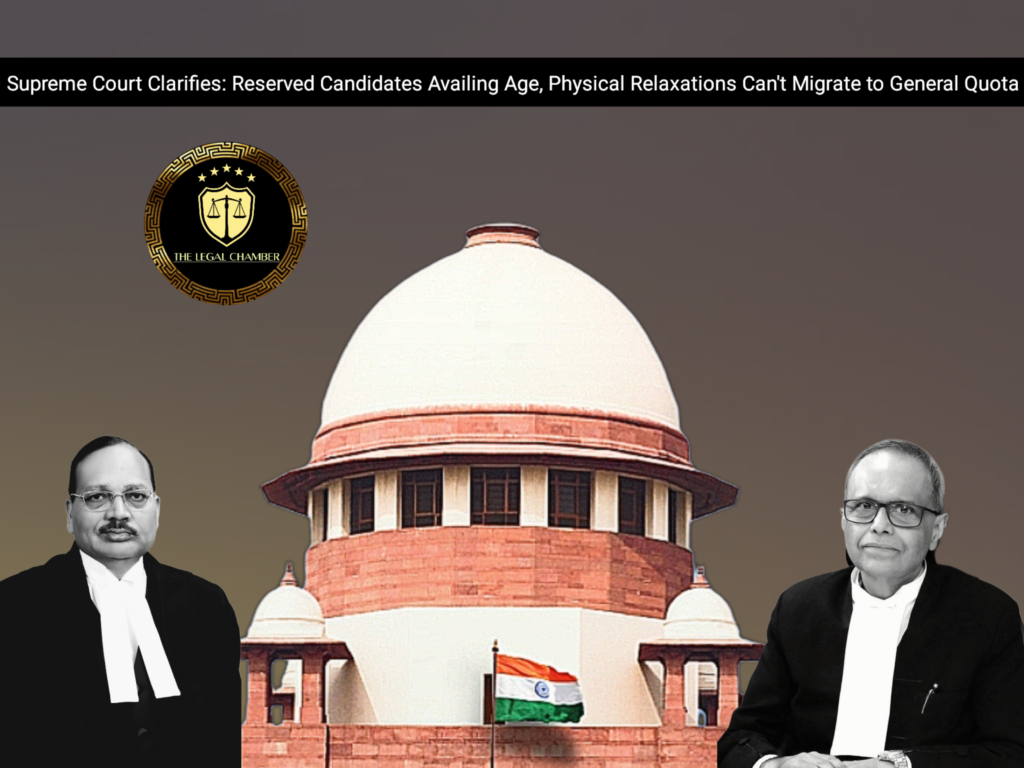
This Supreme Court judgment clarifies that reserved category candidates availing relaxations in age or physical standards are barred from migrating to unreserved vacancies if the governing recruitment rules impose such an embargo. Conversely, relaxations in physical standards based on gender or ethnicity, absent a specific rule, do not automatically preclude such migration. The applicability depends on the explicit provisions of the relevant recruitment rules or office memoranda.
Facts Of The Case:
The case originated from a recruitment drive initiated by the Railway Protection Force (RPF) in 2013 to fill various ancillary posts. The employment notification provided age and physical measurement relaxations for candidates from SC/ST and OBC categories. A key issue arose regarding candidates from these reserved categories who, after availing these relaxations, scored marks higher than the last selected candidate in the unreserved category. These candidates sought appointment against the unfilled unreserved vacancies. The appellants, the RPF, contested this, arguing that as per the applicable Standing Order No. 85, read with a Revised Directive, such migration was barred for candidates who had availed concessions. The respondents, the candidates, relied on a different standing order, No. 78, which permitted such migration. The High Court had ruled in favour of the candidates, directing their appointment. The Supreme Court was thus tasked with determining which standing order governed the recruitment and whether reserved category candidates who had availed relaxations could be appointed against unreserved vacancies. A connected appeal involved a similar challenge against the selection of a Scheduled Tribe candidate in the CISF, who was selected in the general category after availing a concession in the minimum height requirement.
Procedural History:
The procedural history of this case involves two separate Special Leave Petitions (SLPs) that were heard together by the Supreme Court. The first case, Railway Protection Force & Ors. v. Prem Chand Kumar & Ors., originated when the respondent candidates, who were not selected in the reserved category, filed a writ petition before the High Court. They sought a mandamus for their appointment against unfilled unreserved vacancies, arguing they had scored higher than the last selected unreserved candidate. The High Court allowed their petition. The appellants, the Railway Protection Force, then challenged this decision before the Supreme Court via SLP (C) No. 20866/2019. The second case, which was clubbed with the first, also reached the Supreme Court via SLP (C) No. 28469/2019 after the Delhi High Court dismissed a similar writ petition. The Supreme Court granted leave in both matters, heard them jointly, and delivered a common judgment, allowing the first appeal and dismissing the second.
READ ALSO:Proof of Tenancy: Supreme Court’s Key Ruling on Rent Receipts and Title Disputes
Court Observation:
The Supreme Court made distinct observations for the two appeals. In the RPF case, the Court observed that the recruitment was governed by Revised Directive No. 29, which partially modified the earlier Standing Order No. 78 and made the procedure under Standing Order No. 85 applicable. It held that Paragraph 14(f) of Standing Order No. 85, which bars reserved category candidates who availed relaxations in age or physical measurements from migrating to unreserved vacancies, had an overriding effect. Consequently, such candidates, even with higher marks, could not be appointed to the general category. In the CISF case, the Court observed that the Office Memoranda of 1998 and 2018, which restrict migration for candidates availing relaxed standards, do not expressly include concessions in physical measurements like height. Interpreting the word “etc.” in the memo using the ejusdem generis principle, it held that relaxations based on gender or ethnic background are distinct from relaxations in age or qualifications. Therefore, no embargo existed to prevent a reserved candidate who availed a height concession from being selected on merit against an unreserved vacancy.
Final Decision & Judgement:
The Supreme Court allowed the appeal in the RPF case (SLP(C) No. 20866/2019), setting aside the High Court’s judgment. It held that the recruitment was governed by Standing Order No. 85, which expressly barred the migration of reserved category candidates to unreserved vacancies if they had availed relaxations in age or physical measurements. Consequently, the respondents-writ petitioners were not entitled to such appointment. Conversely, the Court dismissed the appeal in the CISF case (SLP(C) No. 28469/2019), upholding the High Court’s decision. It ruled that the applicable Office Memoranda did not impose an embargo on migration for candidates who availed concessions in physical standards, as such standards are based on gender and ethnicity. Therefore, the selected ST candidate was rightfully appointed to the unreserved post.
Case Details:
Case Title: Railway Protection Force & Ors. versus Prem Chand Kumar & Ors. Civil/Criminal Appeal No: (@ SLP (C) No.20866/2019) Date of Judgement: September 09, 2025 Judges/Justice Name: Justice Joymalya Bagchi and Justice Surya Kant
Download The Judgement Here